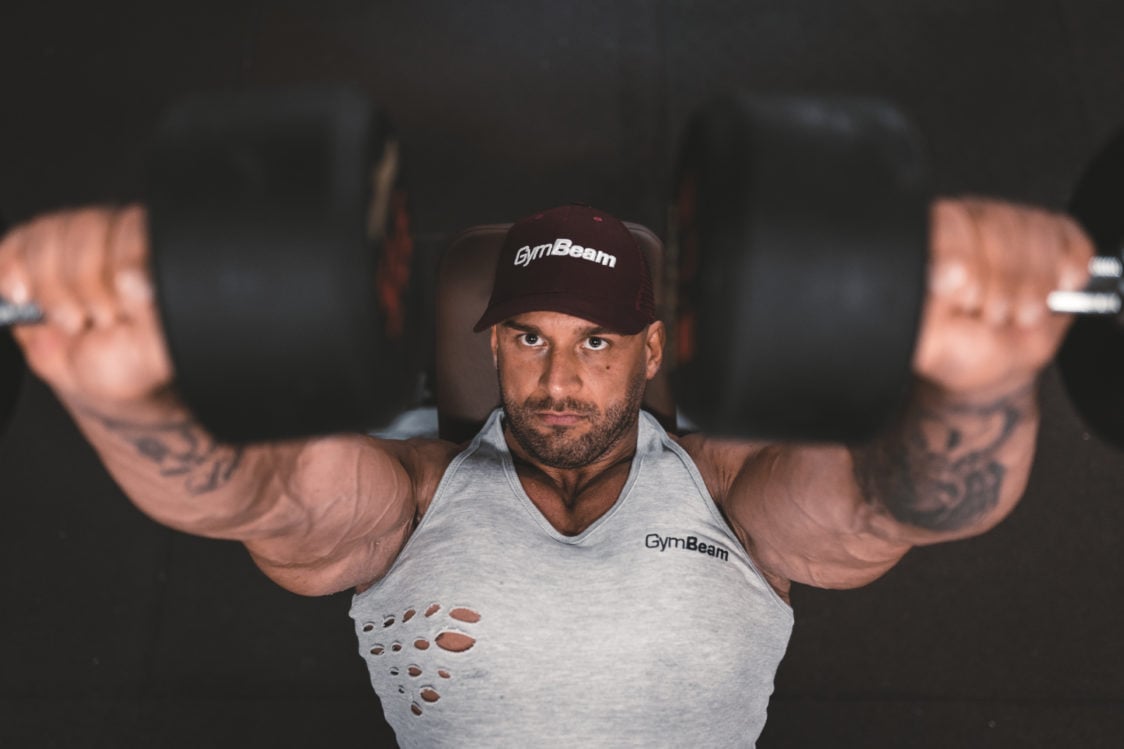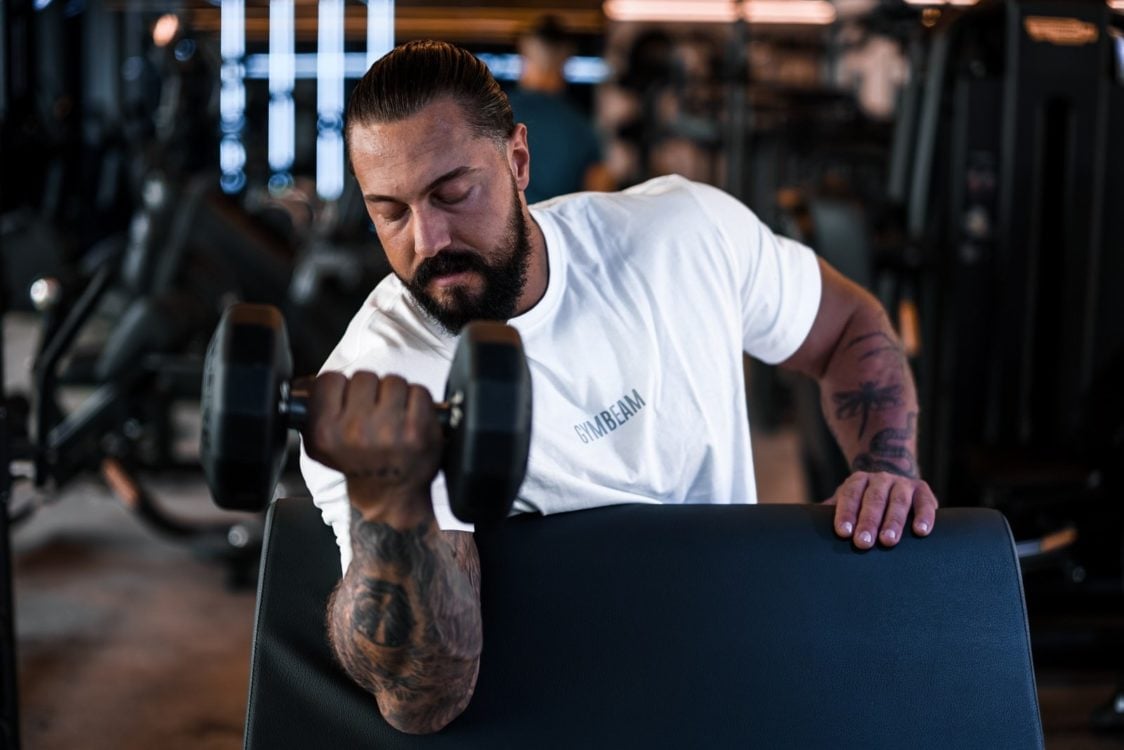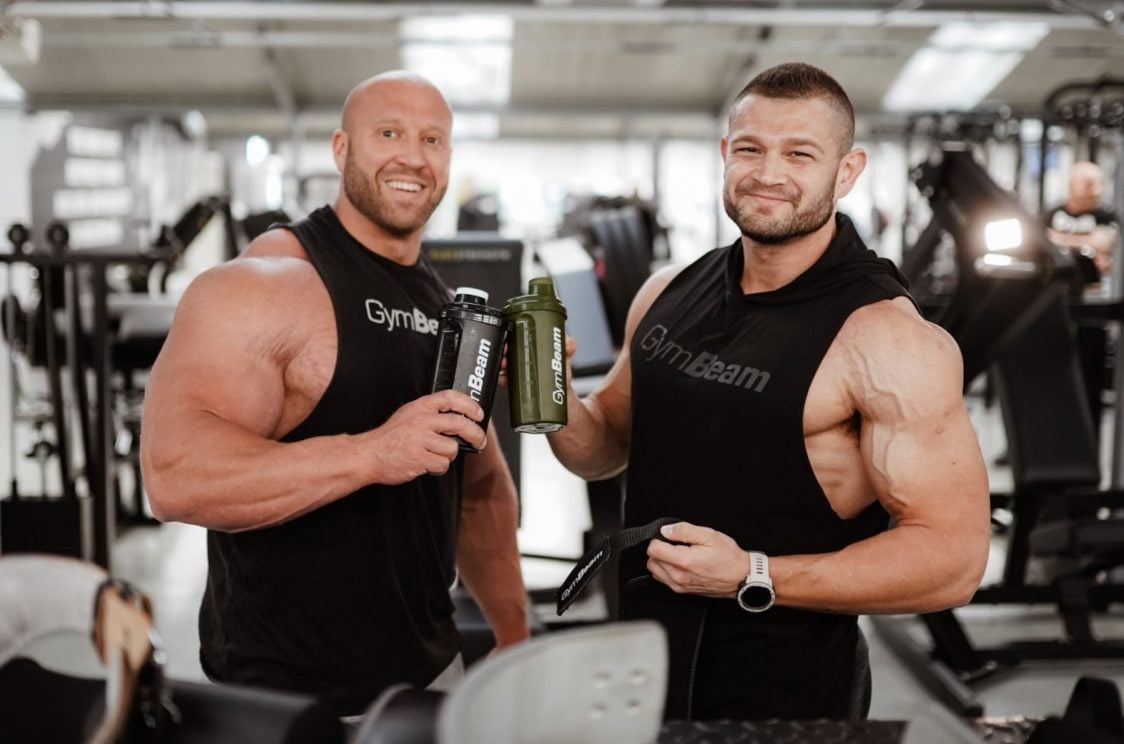Table of Contents
I think we can all agree that practically all of us can achieve an attractive athletic physique through regular consistent training, supported by good nutrition and a healthy lifestyle. But not everyone can become a national bodybuilding champion or a world champion. Only a select few can then take to the boards of the Mr. Olympia competition and even win it. How is that possible? Apart from an iron will and self-discipline, it is largely due to your genetic predisposition to grow muscle mass and strength. That’s what we’re going to look at today.
How do muscles grow? Training, nutrition and a healthy lifestyle are key
It may sound like a cliché, but if you want to build muscle and strength, it requires you to:
- Progressively increase the intensity of your training in slow steps so that your muscles gradually adapt and grow.
- Consume adequate amounts of calories, protein and all the necessary nutrients.
- To lead an overall healthy lifestyle with room for endurance activities as well as recovery and plenty of sleep.
- The levels of anabolic and catabolic hormones (testosterone, insulin, cortisol) also have a big influence and you can maintain them at optimal levels by following the points above.
- And last but not least, you must not forget the powerful might of genetics.
If you are looking for more practical training and nutrition tips for muscle growth, you can find them in our article What to Eat and How to Exercise to Finally Gain Muscle?
How do genetics affect muscle growth and strength?
In a way, genetics brings a degree of injustice into all of this. I’m sure you all know this from personal experience. Take the example of John and George.
- The king of the local gym John practically never paid attention to a quality diet, he broke records in alcohol consumption every weekend and his efforts in training were not even exemplary. But what can you say, his impressive biceps, bulky chest and back as wide as an airstrip were unmatched by anyone far and wide.
- George, on the other hand, faithfully followed a carefully designed training and nutrition plan, regeneration and lifestyle, and yet he always lacked that little something that John had.
- That’s not entirely fair, is it? Unfortunately, that’s life.
Scientific studies in the field of sports genetic testing tend to focus on endurance athletes, so all research in strength sports is relatively in its infancy. Even so, science has identified several dozen different gene variants that more or less influence the development of muscle mass and strength. We’ll only highlight the most important and well studied ones. [8]

You might be interested in these products:
The most important genes controlling muscle growth and strength:
1. Myostatin gene (MSTN) affects muscle mass
The activity of this gene (MSTN), which is genetically determined, influences the amount of myostatin produced in muscle cells. It is a regulatory protein that prevents “excessive” muscle growth by reducing the production of muscle proteins in muscles.
- Ben-Zaken’s study showed that a favourable combination of one of the variants of this gene, together with a variant of the gene encoding the anabolic hormone IGF-1, was associated with higher blood concentrations of the anabolic hormone IGF-1, increased muscle mass and improved endurance performance in athletes. [1]
- Another study concluded that a specific allele (variant) of the myostatin gene shows a different prevalence among white and black athletes, which may partly explain their different muscle growth potential. [4]
- A Chinese study then showed that the MSTN gene variant is associated with higher muscle mass gains during strength training. [9]
A certain mutation of this gene is thought to be present in the two-time Mr. Olympia winner, the gigantic Egyptian Big Ramy, or in the German track cyclist Robert Förstemann, known for his giant quadriceps.
2. The ACTN3 gene encodes the ability for maximum strength performance and better recovery
The ACTN3 gene encodes properties of the alpha-actinin-3 protein, which is involved in muscle contraction. It is found mainly in fast-twitch muscle fibres (type II), which have the highest potential for generating maximum power and strength. These muscle fibres are more prone to hypertrophy and tend to be more abundant in sprinters or strength athletes. Specific favourable variants of this gene are more prevalent in elite sprinters and strength athletes, giving them an undoubted competitive advantage over their rivals. [3]
3. The CK-MM gene encodes the activity of an enzyme involved in rapid energy acquisition during exercise
The enzyme creatine kinase is involved in the process of cellular energy (ATP – adenosine triphosphate), especially during intense muscle work. Certain variants of this gene are more common in individuals with high athletic performance. Therefore, we can speculate that this gene may also have an effect on the potential for muscle growth – faster ATP production during heavy strength sets may lead to longer time under tension in muscles and thus better stimulation of muscle growth. For the record, the well-known dietary supplement creatine also works on a similar principle of more rapid ATP production. [6]
4. The ACE gene influences muscle growth, strength and cellular oxygen utilisation
The last gene often mentioned with some relation to muscle growth and strength is the gene encoding the so-called angiotensin-I converting enzyme. There are 2 known alleles (variants of the gene) with the names “I” and “D”. [7]
- Studies have shown that the “I” allele is associated with a better aptitude for endurance sports.
- The “D” allele is attributed to a predisposition for greater strength abilities and also a higher potential for muscle growth.
In one study, carriers of the “DD” and “DI” alleles had even greater increases in muscle strength than carriers of the “II” allele during a 9-week training program. [5]

Knowing your own genetics can help you discover hidden potential
Every healthy athlete can build an athletic, muscular and aesthetic lean physique with a consistent regimen. It is clear, however, that some people’s genetics will allow them to develop a much larger muscle volume, while others will simply not be able to gain that amount of muscle mass naturally.
Some people have the genetic ability to successfully succeed in bodybuilding and strength sports, others do not. And in that case, with the same effort in training, diet and other factors, you simply cannot measure up to those who are genetically gifted. Most of the time, you can see these abilities quite reliably in the first few months or years of training. For some people, the first visible progress doesn’t take long and the overall progress continues for years to come, while for others the gains are slower with the same training effort, nutrition and recovery.
You have to come to terms with this and accept your genetic limits. Be careful, however, don’t blame your unsatisfactory muscle gains on bad genetics, because the underlying problem is often a lack of training effort, inappropriate training or inadequate nutrition and supplementation. These factors must be learnt to recognise and separate them from each other.
Sometimes it is also necessary to reconsider your goals in terms of your physique and abandon any unrealistic physiques of top bodybuilders, who often owe their physique to doping. However, the journey to the threshold of your innate genetic limits of muscle development can be extremely interesting, exciting, surprising and can take decades of training – and it’s damn well worth the effort!
On your journey to becoming the best version of yourself, a few tips can also help you, which you can find in our article 10 Nutrition and Training Tips for Maximum Muscle Growth.

Where and how to have your genetic aptitude for muscle growth and strength tested easily?
Nowadays, there is a simple option to undergo genetic testing using DNA home tests in the form of sampling kits from specialised laboratories that offer the evaluation of whole panels of different genetic parameters with clear explanations.
This genetic testing is increasingly attractive for athletes. The test includes analysis of different areas of athletic performance divided into aerobic and strength components. In addition, the genetic basis for the development of cramps, the time required for recovery after exercise, the antioxidant capacity of the body, caffeine metabolism, the use of fat as a source of energy during activity and other interesting parameters can also be determined.
Home DNA analysis tests will reveal the secrets of your genes and offer a unique opportunity to improve athletic performance in line with your unique DNA. You will learn information about yourself that can help you reach your natural potential for muscle growth and strength. For example, you’ll also find out if you need to work on recovery or improve your diet. This can also help reduce your risk of developing muscle cramps.
Screening for hidden traits for rare inherited diseases such as phenylketonuria, cystic fibrosis, muscular diseases, etc., which we could pass on to our offspring, also seems to be of great interest. This could happen even if you or our partner do not suffer from these diseases. The examination can also give us information about the risk of developing so-called civilisational diseases (type 2 diabetes, cardiovascular diseases, certain types of cancer).
Interested in this topic and want to learn more about home DNA testing? Find out the essentials in our article Everything You Need to Know About Home DNA Testing. If you want to try genetic testing, you shouldn’t miss the test kits available from TellMeGen and GenePlanet.
What should you remember?
Scientific studies in the field of sports genetic testing tend to focus on endurance athletes, so all research on strength sports is relatively in its infancy still.
Therefore, it is not yet possible to adequately answer the frequently asked question how much of the total mosaic of muscle growth is attributable to genetics. However, the influence of genetics certainly cannot be neglected, and on a performance or even professional level in fitness and strength sports, it will be the deciding factor in success and failure.
Even if you don’t have TOP genetics for building muscle mass, with proper training and diet you can still build an aesthetic and muscular physique that is far beyond the average. Naturally perfecting your physique is the race of a lifetime for many fitness athletes, and this is where the journey = the destination.
Do you have someone among your friends who argue that muscle growth is only influenced by the way you work out at the gym? Then share our article with them to find out how genes can also play a big role.
[1] Ben-Zaken – The combined frequency of IGF and myostatin polymorphism among track & field athletes and swimmers – https://pubmed.ncbi.nlm.nih.gov/28007336/
[2] Eider J. – CKM gene polymorphism in Russian and Polish rowers – https://pubmed.ncbi.nlm.nih.gov/26027379/
[3] Eynon N. – Genes for elite power and sprint performance: ACTN3 leads the way – https://pubmed.ncbi.nlm.nih.gov/23681449/
[4] Ferrell R. – Frequent sequence variation in the human myostatin (GDF8) gene as a marker for analysis of muscle-related phenotypes – https://pubmed.ncbi.nlm.nih.gov/10610713/
[5] Folland J. – Angiotensin-converting enzyme genotype affects the response of human skeletal muscle to functional overload – https://pubmed.ncbi.nlm.nih.gov/11038409/
[6] Chen Ch. – A meta-analysis of the association of CKM gene rs8111989 polymorphism with sport performance – https://www.ncbi.nlm.nih.gov/pmc/articles/PMC5819473/
[7] Puthucheary Z. – The ACE Gene and Human Performance – https://link.springer.com/article/10.2165/11588720-000000000-00000
[8] Varillas-Delgado D. – Genetics and sports performance: the present and future in the identification of talent for sports based on DNA testing – https://www.ncbi.nlm.nih.gov/pmc/articles/PMC9012664/
[9] Xiao L. – The A55T and K153R polymorphisms of MSTN gene are associated with the strength training-induced muscle hypertrophy among Han Chinese men. – https://pubmed.ncbi.nlm.nih.gov/24479661/


Add a comment